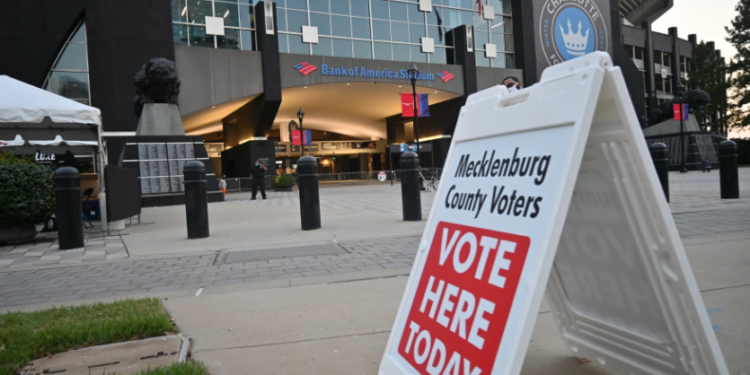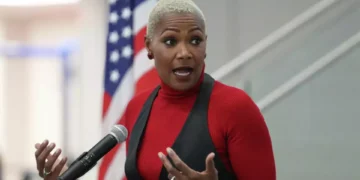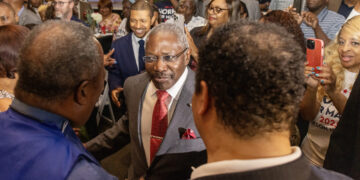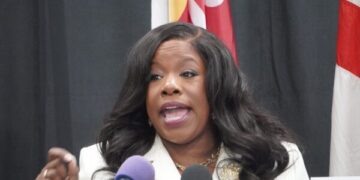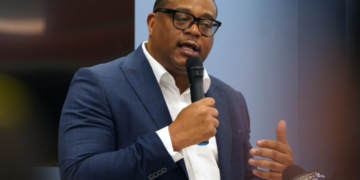Oct 22, 2024 Story by: Editor
After five days of early in-person voting in North Carolina, two distinct trends have emerged: Republicans are increasingly participating in early voting, a shift from previous years, while fewer Black voters have taken part in early, in-person voting compared to the same period four years ago.
At this point in the 2020 election between Joe Biden and Donald Trump, 281,000 Black Democrats in North Carolina had cast early, in-person ballots. This year, however, after five days, that number has dropped to just over 206,000, marking approximately a 27% decrease, according to data from the John Locke Foundation’s Vote Tracker.
Democratic consultant Thomas Mills voiced concern, saying, “There’s time for Democrats to fix that. But it needs to happen pretty quickly. They can’t really continue to hemorrhage votes among the Black community and hope to stay competitive.”
The 2020 early voting period was heavily affected by COVID-19, causing a surge in mail voting, primarily among Democrats. The 2024 early voting data reveals changing patterns as more GOP voters are opting to vote early. Donald Trump has actively encouraged early voting for Republicans this year, even after previously opposing mail voting due to concerns about fraud.
Tom Bonier from election consulting firm TargetSmart cautioned against direct comparisons with 2020. His firm estimates that, at this stage in the 2020 election, Black voters made up 24% of the electorate, dropping to 20.2% by the final count as more Republicans voted on Election Day. Trump secured North Carolina by a margin of over 74,000 votes, or slightly more than 1%.
Currently, Black voters represent 19.5% of the early voting turnout, down from 24% in 2020, and at a similar level to 2022’s U.S. Senate race, where they were 19.2%. Official statistics from the N.C. Board of Elections place Black voter turnout at 18.6%, although TargetSmart reports a slightly higher figure based on consumer data used to identify race.
Election concerns among Black Democrats are growing. “The numbers are down,” said Jocelyn Nolley, chair of the Black Political Caucus of Charlotte-Mecklenburg, adding, “And don’t get me wrong, we are very concerned (about the numbers) from last week.”
Nolley attributed part of the initial low turnout to events like homecoming weekends at Johnson C. Smith University and North Carolina A&T, noting her organization’s targeted outreach efforts, particularly toward Black men—a key demographic for Trump’s campaign. National polls have shown that Vice President Kamala Harris is facing challenges in gaining Black and Latino voter support comparable to levels seen for Hillary Clinton and Joe Biden.
“I am nervous,” Nolley stated. “It’s a very close race. We are doing anything that sticks to get the Black vote out.” Harris’s campaign is working with churches and campus voting drives to boost Black turnout. “We have always known this would be a close race, but we’ve built an operation to reach voters in every corner of N.C.,” a campaign official noted.
On the Republican side, the GOP has encouraged early voting through its “Bank Your Vote” initiative. However, Trump’s stance has fluctuated. Although he previously criticized early voting, calling it “stupid” at a Pennsylvania rally, he eventually reiterated his call for Republicans to vote early or on Election Day, saying, “Go out and make a plan to vote early, vote absentee, or vote in person on Election Day, but you gotta get out and vote.”
In North Carolina, Republicans have heeded this call, matching Democrats with 20% of their supporters voting early. Jason Williams of the Faith and Freedom Coalition highlighted that early voting aids the GOP by freeing up resources to target voters who haven’t yet voted, explaining, “If you get out early we’ll be able to use the resources to target low to mid-propensity voters who haven’t voted yet, and I think people are buying that.” Source: WUNC


